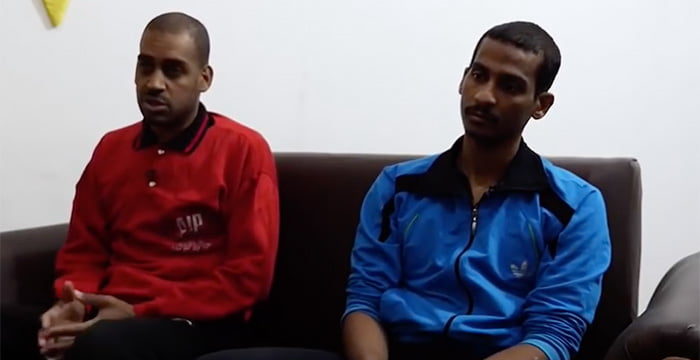What’s the point of having no death penalty in Britain if we extradite people to countries where they do?

In previous cases Britain has asked for a guarantee that convicts will not suffer the death penalty when they are extradited to other countries. What is unusual in the case of Kotey and Elsheikh, two Brits who are said to be members of the Beatles cell of ISIS, is that Britain has made no such demand this time.
The two accused were captured in Syria by the US-backed Syrian Democratic Forces in January. They are believed to be part of the Beatles group in which the third member is dead and the fourth is being held in Turkey. Overall the Beatles captured a range of foreign hostages earning millions of dollars in ransom payments. Allegations of the pair include videotaping beheadings, exploitation and execution of Western detainees, and having links to the British terrorist called ‘Jihadi John’. The case has since stirred up quite a lot of attention around the world.
A letter from the Home Secretary to the US Attorney General regarding this case has now been leaked to the media. Sajid Javid has been heavily criticised for noting that they would not demand a ‘no death penalty’ assurance this time. Understandably, this has upset quite a lot of human rights groups and civil liberties campaigners. Does this signal a departure of Britain from their long stance on death penalty abolition?
So, what is happening politically? Despite the Home Secretary privately approving this, Theresa May is now refusing to back the execution. Shami Chakrabarti, Labour’s shadow attorney general, also disapproves and comments that Javid appears to be encouraging this human rights abuse. Amnesty International is right to be worried that this development will cast doubt around the world whether Britain continues to advocate abolishment of the cruel and degrading practice of death sentencing. There seems to be chaos in the media as politicians scramble to come up with a response to this issue and human rights groups are launching criticism at the Home Office.
Want to write for the Legal Cheek Journal?
Find out moreWhilst this case raises several human rights issues, including the fact that the pair might be sent to controversial Guantanamo Bay, the most significant is how easily Britain departs from its opposition to the death penalty. When even the mother of a son beheaded by the IS cell is against the idea of a death penalty for the accused, we know that something must be wrong. The danger with the death penalty is that there is always the chance that an innocent man or woman may die because of a failure in the system. It is scary to think about the number of people that have had convictions overturned because of aid from organisations like the UK Innocence Project. However, these will be of no help to a person that is dead.
The Home Secretary’s defence to the criticism appears to be that the US has additional charges for terrorism that the UK currently doesn’t. His line of argument therefore appears to be that they are more equipped to handle the trial. However, this can surely be no defence to not demanding a ‘no death penalty’ assurance. His statement that he is “of the view that there are strong reasons for not requiring a death penalty assurance in this specific case” are worryingly vague.
He also argues that despite this decision they continue their policy to not assist in US death penalty cases generally. This does nothing to eliminate my concern because if they can make one exception, they can easily find reasons for making others. Norway’s opposition to the death penalty was made especially clear when they even refused to impose the death penalty on the biggest Norwegian terrorist we have seen. Yes, the UK is not considering re-introducing the death penalty to their own criminal justice system. Is allowing it to happen and looking the other way any different though? I would strongly argue that it is not.
We cannot facilitate the inhuman execution of this pair just because it is under another jurisdiction. Terrorist cells of ISIS are breaching human rights in the most horrible ways, but we should not sink to their level. It is in the UK Government’s best interest right now to come up with a real response and make their stance on death penalty clear to the rest of the world.
Kristin Klungtveit is a first year undergraduate law student at the University of East Anglia.

Please bear in mind that the authors of many Legal Cheek Journal pieces are at the beginning of their career. We'd be grateful if you could keep your comments constructive.